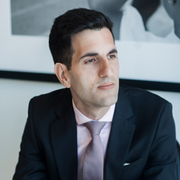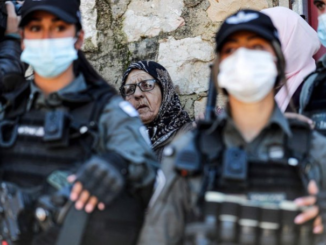
Recently, I came across an online post made by well-known musician and pro-Palestinian activist, Rogers Waters, on his Facebook account. What was interesting about it for me was that it had no caption.
The post itself was a link to an article featuring an interview he did with the German news outlet, Der Spiegel.
I thought this was interesting for at least two reasons. First, the lack of a caption. Waters typically shares posts, even the less political and more musical, with some kind of description speaking to why he did so.
It’s not surprising. Waters, refreshingly (and no pun intended), shoots from the hip. In an age where many—especially online—hide behind images and digital representations they’ve created of themselves, he remains honest, transparent, and open about what he does when he does it.
Secondly, the interview is on the heels of the Municipality of Frankfurt deciding to ban Rogers from performing in the German city, on account of the false charge that he’s “antisemitic” for being an avid supporter of Palestinian rights, including his own involvement in the Boycott, Divestment, Sanctions (BDS) movement—non-violently aiming to pressure Israel to stop its systematic and violent oppression of the Palestinian people.
Waters however is suing the Municipality. He should be lauded for this not only for the courage it involves but because if he wins it’ll establish an important precedent, sending a message to other misguided governments around the world: censoring pro-Palestinian artists is both wrong and impermissible.
And if you do so on the baseless grounds that being pro-Palestinian is “antisemitic” you should be further disciplined. It’s at once slanderous and tries to suppress the truth of the unnecessary suffering of the Palestinian people, at the hands of Israel, by dishonestly framing such a revelation as hateful.
Nobody should get away with that, all the more so as it ultimately aims to intimidate others into being silent about unnecessary suffering. In turn, Israel is able to easily carry out its inhumane crimes against the Palestinian people with impunity, which unfortunately it has enjoyed too long.
For the two reasons described, I was particularly curious about what I’d find in the Waters interview, leading me to read it only shortly after he posted it. Waters, true to form, held his own throughout the interview itself. He did not once, unlike too many others who are criticized for taking a pro-Palestinian stance, apologize for any of the Palestinian solidarity work he’s undertaken over the years, nor the moral or political views he holds underlying it.
I must confess it brings me joy to see Waters like this, whether reading his words or hearing him speak. His candidness and care for humanity, specifically the Palestinian people, recalls for me a good pub mate you don’t have to be shy around and, frankly, gives a damn about doing serious good in the world so other “blokes”, as Waters might say in his endearing British slang, don’t have to experience awful, inhumane evil.
The man has a heart.
On the other hand Waters’ interviewer, Meron Mendel—director of the Anne Frank Educational Centre—feels manipulative. For the most part, he doesn’t seem to genuinely want to know the details and arguments behind what Waters believes about Palestine but—through lines of questioning that unfairly suggest Waters is antisemitic and that Israel, unknown to Waters, is actually a democracy—seeks to delegitimize Waters for being a rightful proponent of universal human rights, necessarily extending to all Palestinians (not only Palestinians who live in Israel and is part of the “proof” for Mendel that Israel is a “democracy”).
Moreover, Mendel appears to be purposely avoiding any real or deep discussion of that since it would entail of course talking about what such rights necessarily mean, namely dismantling the illegal Israeli occupation of Palestine and the structures that uphold Israeli apartheid—in their entirety.
This, to name only some of its manifestations, includes heavily restricting Palestinian movements, denying them proper medical care, keeping them trapped in the open-air prison that is Gaza (now over 15 years), preventing their having fair legal recourse (in a judicial system that does not routinely discriminate against Palestinians) after their homes are illegally demolished.
Rather than critically exploring this with Waters, Mendel is adamant about misframing BDS as counterproductive as it is at odds with “dialogue”. Part of that involves this exchange between Waters and Mendel:
Mendel: When I was 14 or 15, there was a project that brought Israeli Jews and Palestinians together. And we learned from each other. Today, the peaceful dialogue has fallen silent. Why? Because of BDS. But without dialogue, there will be no peace.
Waters: Do I understand you correctly? You say that the boycott movement has destroyed the peace process?
Mendel: Yes, they have made all initiatives for dialogue impossible. Because dialogue and boycott do not go together.
Waters: We have an organization here, BDS, that campaigns for equal human rights for all those who live between the Jordan River and the Mediterranean Sea – I’m just talking about the geographical space. Because people live there who are deprived of their basic human rights. BDS is an attempt to draw worldwide attention to this problem. And you are telling me that this would destroy the peace process? How is that possible?
Reading this, especially Waters’ relatable and wholly understandable disbelief at Mendel, I had something of an epiphany: so-called “progressives”, against BDS but for peace between Palestinians and Israelis, often fetishize dialogue.
Similar to Mendel they do so by over-idealizing dialogue as the best solution to political problems. The naive reasoning behind it is that eventually, through the rational exchange of ideas and points of view, people can agree on how to fix such problems. In the process, we avoid more confrontational or “radical” politics, such as resistance efforts that disrupt structures of power (e.g. the state).
I remember as a philosophy instructor how I’d teach similarly. Drawing from the likes of Socrates I’d illustrate how when people come together, no matter how different they are, they can “figure stuff out” through patient deliberation and conversation, where no one loses their cool and people respectfully pose and answer questions.
The Waters’ interview allowed me to more clearly see how naive this is and that, in real life (outside the philosophy classroom), dialogue regularly leads nowhere. So as to avoid sounding altogether cynical, this is not to dismiss the value dialogue has.
It is but one communicative means through which we can learn from one another, build community and sustain healthy relationships. But in certain circumstances dialogue is a waste of time because our interlocutor—the person with whom we’re speaking—is in denial of reality. We see this with Mendel’s refusal to accept that Israel is not a democracy.
That is not mere opinion but fact, based on material evidence documented the world over, such as by leading human rights bodies like the United Nations and Amnesty International, showing all the ways that Israel systematically disadvantages (and violently) the Palestinian people. It does not do the same to Israelis for the crude but simple reason that they are not Palestinian.
Additionally, Israel has proven by its own actions that no dialogue with it will lead to Palestinian justice. Whenever there has been an attempt to do that, such as through the Oslo Accords (1993) and Camp David Summit (2000), Israel does not want to acknowledge fully what it’s doing: eliminating, however gradually, the existence of Palestine.
It should be clear by now that though Israel may technically believe in dialogue it doesn’t care, in that process, to work with Palestinians to ensure, one, they are no longer deprived of human rights by Israel itself and, two, are compensated by Israel for all the criminal theft, oppression, brutality, etc. the state has forced them to endure.
BDS can help achieve this. It’s but one (non-violent) means by which to exert pressure on Israel, such as through undermining its economy, to end its woeful mistreatment of Palestinians. That’s a necessary starting point if Palestinians and Israelis are ever to live together, as equals, in a true democracy.
Like Waters, that’s what I think many of us in solidarity with Palestine would like to see. Dialogue, for the time being at least, won’t primarily get us there. Israel is too proud and too morally corrupt to engage in any discussion of the colossal harm it does to Palestine.
So long as that’s not on the table, there’s really nothing for Palestine and Israel to talk about.

– Paul Salvatori is a Toronto-based journalist, community worker and artist. Much of his work on Palestine involves public education, such as through his recently created interview series, “Palestine in Perspective” (The Dark Room Podcast), where he speaks with writers, scholars and activists. He contributed this article to The Palestine Chronicle.








